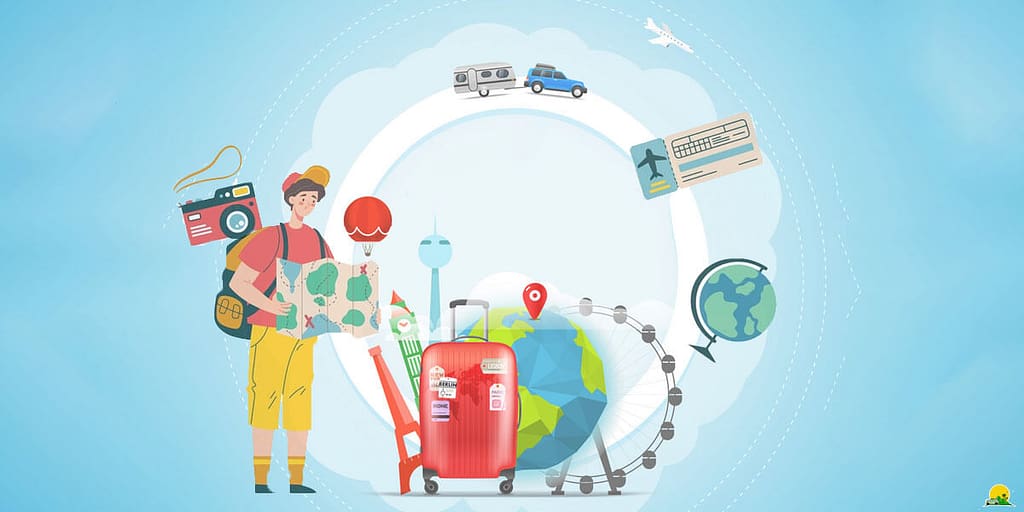Planning Your Round-the-World Trip: A Comprehensive Guide

Planning Your Round-the-World Trip: A Comprehensive Guide
Travelling the world is a dream for many, yet the scope and scale of such an endeavour can seem daunting. With proper planning and strategy, you can make this dream a reality. This guide will provide you with everything you need to know to plan and embark on the Round-the-World Trip of a lifetime.
index
ToggleReasons to Travel the World
Before delving into the specifics of planning, it is worth reflecting on why travelling the world holds such appeal. Numerous personal and professional benefits can be gained from an extended international excursion.
On a personal level, travelling the world provides an opportunity for tremendous growth. You will gain exposure to new cultures, ideas, cuisines, and ways of life. This cultural immersion helps develop empathy, flexibility, and an expanded worldview. Travel also nourishes creativity; being in unfamiliar environments sparks fresh perspectives.
Professionally, an around-the-world trip demonstrates courage, curiosity, and adaptability to future employers. Many jobs today require interacting with colleagues from diverse backgrounds. Firsthand cultural experience abroad provides valuable skills for global careers. Travel also allows networking with locals, which may lead to future opportunities.
From a wellness standpoint, travel reduces stress and promotes happiness. We are changing scenery, which tricks our brains into perceiving new experiences as pleasant and releases dopamine. Spending time in nature also boosts mental and physical health. The perspective gained from travel enables us to appreciate better what we have.
Finally, a global excursion creates memories that last a lifetime. The friends made, adventures shared, and stories collected will be recounted for years to bring smiles. Travelling widely early in life also ignites wanderlust, making you more likely to continue exploring the world. For all these reasons, planning a round-the-world trip is a worthwhile pursuit.
Setting Your Budget
Establishing a realistic budget is essential for planning a sustainable Round-the-World Trip. Consider your daily or monthly budget based on your desired destinations and activities. Use online tools like Numbeo to research the costs of living abroad.
When calculating expenses, account for transportation between destinations, accommodation, food, attractions, insurance, gear, communications, and an emergency fund. Review recent bank statements to understand typical spending. Set target amounts for each category based on your research.
To save money, choose affordable destinations, utilize hostels, cook some meals, take public transit, and look for free activities. Travel slowly through fewer places if needed to fit your budget. Be flexible as unexpected costs arise. Build a funding buffer to make sure your Round-the-World Trip runs smoothly.
Funding options include working savings, selling possessions, crowdfunding, credit card sign-up bonuses, house sitting, and teaching English online. Consider part-time remote work. Travel rewards credit cards can fund flights if used responsibly. Apply for scholarships through organizations sponsoring global experiences.
Even those on modest budgets can realize their travel dreams with diligent budgeting. Focus on quality over quantity by prioritizing meaningful experiences over superficial tourism. Stick to your budget to avoid debt that outweighs memories. Financial discipline allows longer, lower-stress travels.
Planning Your Itinerary
With a budget set, craft a flexible itinerary factoring seasonality, climate zones, visa requirements, and transportation logistics between destinations—research locations of interest to add depth and avoid rushed tourism.
Start broad to allow the discovery of unexpected passions. Narrow options over time as interests and budget clarify. Balance major hubs with lesser-known gems for cultural immersion. Include time for R&R to avoid burnout.
Consider starting and ending in your home country for easy flights. Fly into a region and travel overland when practical, like through Southeast Asia, Europe, or South America. Book transport up to 3 months in advance when possible for savings.
Allot at least 2-4 weeks minimum per continent to overcome jet lag and truly experience a place. Spend more in locations you’re most excited about or require significant travel between, like Australia and New Zealand.
Build buffer days for travel mishaps without cutting your Round-the-World Trip short. Travel slowly if needed for a sustainable pace. Your itinerary will evolve organically as new interests emerge, so remain flexible. Balance structured plans with open days for serendipity.
Acquiring Necessary Documents
Proper documentation is crucial for smooth international travel. Confirm passport validity of at least six months beyond your return date. Apply for visas depending on destinations, allowing processing time.
Consider a multi-entry visa or visa on arrival if visiting a region multiple times. Review entry requirements for vaccinations, primarily those related to COVID-19. Make copies of your passport, visa, insurance, and other documents to email for easy access abroad.
Register your Round-the-World Trip with your country’s embassy subscription service for overseas travel advisories and consular assistance. When savings are significant, get transportation like rail passes and the regional flight passes in advance.
Research if any destinations require additional permits and make arrangements. Confirm you meet the criteria for activities like working or studying abroad. Follow all documentation rules for re-entry to your home country as well. Preparation eliminates stress from unforeseen visa or travel issues.
Packing Light

Packing light is essential for long-term travel comfort and convenience. Use a durable wheeled carry-on bag and daypack. Leave sentimental items at home. Focus on versatile, lightweight pieces that layer and mix and match for many looks.
Prioritize synthetic fabrics that dry quickly and don’t wrinkle. Choose neutral colours to blend in and avoid stains. Pack for variable climates with a sun hat, lightweight jacket, bathing suit, and accessories. Roll clothes to minimize space.
Remember travel documents, medications, toiletries, electronics, power adapters, spare contacts/glasses, a repair kit, a lightweight travel towel, and a money belt for security. Consider packing travel-sized toiletries or refilling empty containers to cut weight.
Leave room in your bag for souvenirs or new clothes acquired abroad. Ship excess baggage ahead to your next destination if needed—the lighter your load, the less hassle at airports and local transport. Packing minimally allows focusing on experiences, not things.
Staying Healthy on the Road
Prioritize health and wellness to enjoy your travels fully. Consult physicians about necessary medications, vaccinations for destinations, and any potential health issues to address in advance.
Pack a well-stocked travel first aid kit and consider buying travel insurance. Stay hydrated by drinking bottled or purified water. Eat a balanced, mostly plant-based diet, and avoid raw or undercooked foods in developing nations.
Practice good hygiene, like handwashing and brushing teeth with purified water. Use insect repellent as needed and sleep under a mosquito net if the risk of malaria exists. Wear sunscreen daily and reapply often when outdoors.
Allow your body to adjust to new time zones gradually. Pace yourself to avoid burnout. Get adequate rest and listen to your body if under the weather. Seek medical help promptly if symptoms persist or worsen.
Prioritize mental wellness with mindfulness, journaling, time alone in nature, and saying “no” when overwhelmed. Travel can be stressful; find healthy ways to cope and ask for help from others if isolation impacts your well-being. Self-care ensures safe, fulfilling travels.
Communicating Abroad
Reliable communication is essential while traveling independently. Consider purchasing an international plan through your cellular provider for data and texting. Or buy a local SIM card upon arrival for the best rates.
Wi-Fi calling and messaging apps like WhatsApp provide accessible communication when on Wi-Fi. Pack a global power bank to keep devices charged. Inform your bank and credit card company of travel dates to avoid fraud alerts from international charges.
Notify family and friends of your itinerary and contact information. Check-in occasionally so they don’t worry. Consider travel tracking apps for an extra layer of safety. Translate emergency contacts into local languages in case of an emergency abroad without access to devices.
Learn a few key phrases in local languages to build rapport. Be aware that public Wi-Fi networks abroad may lack security. Use encrypted messaging apps for sensitive information. Backup photos online or to the cloud in case of lost or stolen devices. Preparation ensures you stay connected during adventures.
Read More: A Guide to Cities with the Most Spectacularly Lit Buildings
Being a Conscious Traveler
Travelling responsibly and respectfully is essential. Research local customs, laws, and etiquette to avoid cultural blunders. Dress and act appropriately based on the destination, especially if visiting religious sites.
Respect nature by avoiding littering, graffiti, or damaging natural areas. Be mindful of how your actions impact local communities. Purchase souvenirs directly from artisans when possible to support small businesses.
Immerse yourself in the local culture by interacting with residents, learning the language, trying authentic cuisine, and participating in community events. Avoid tourist traps and discover lesser-known gems off the beaten path.
Tread lightly and leave places better than you found them. Be discreet when photographing people to avoid objectification. Consider volunteering locally to give back. Conscious travel promotes cross-cultural understanding and responsible stewardship of our world.
Staying Safe Abroad
Exercising caution enhances the enjoyment and educational value of travel. Research destinations in advance for potential risks like crime, civil unrest, health issues, and natural disasters. Sign up for travel advisories from your government.
Recent Posts
Contact Us
+1 437 499 4559










